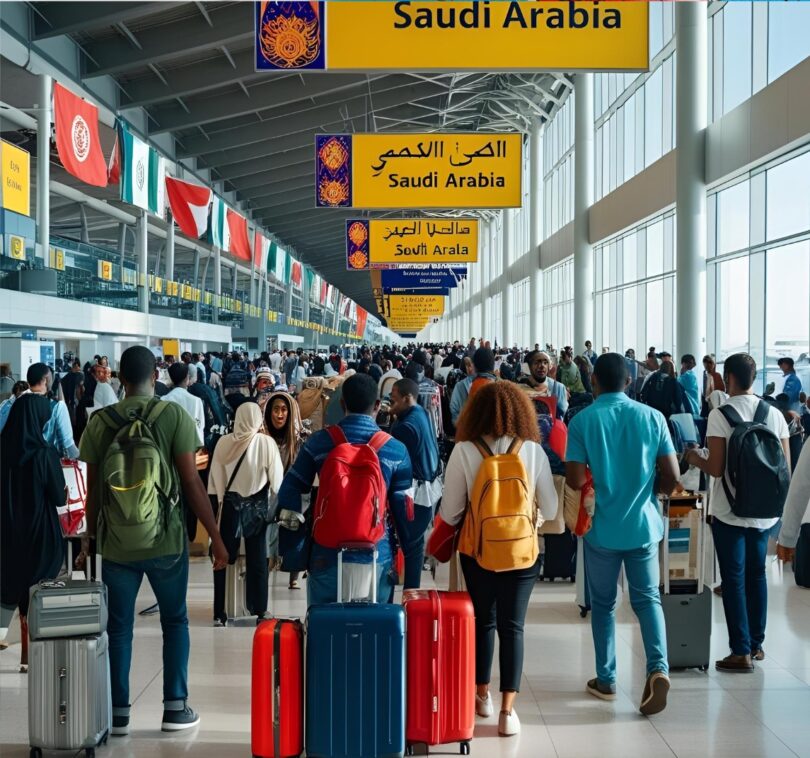Advertisements
If you’re considering moving to Saudi Arabia, you’re in for a unique adventure. It is known for its rich culture, growing economy, and warm climate, which all make it an attractive destination for many people worldwide. However, moving to the country requires understanding the specific pathways and requirements.
This article will show you five straightforward ways to migrate to Saudi Arabia easily. Keep reading to know more!
1. Work Visa: The Most Common Path
One of the most popular ways to migrate to Saudi Arabia is through a work visa. If you have skills in demand, finding a job in Saudi Arabia can be your golden ticket.
Steps to Obtain a Work Visa:
-
Secure a Job Offer:
- Start by searching for jobs through online platforms such as LinkedIn, GulfTalent, or company websites.
- Focus on industries like oil and gas, healthcare, education, IT, and construction, which are highly sought after in Saudi Arabia.
-
Employer Sponsorship:
- Your employer will act as your sponsor, submitting necessary documents to the Ministry of Labor and the Ministry of Interior.
-
Complete Medical Tests:
- You’ll need to undergo a series of medical examinations to ensure you’re fit to work.
-
Apply for a Work Visa:
- Once your documents are approved, your employer will send you a visa authorization number to process your work visa at a Saudi embassy or consulate.
Advantages of a Work Visa:
- There will be quick processing if you’re in a high-demand field.
- You will have the opportunity to bring family members on dependent visas.
Disadvantages:
- You will be tied to your employer for sponsorship.
2. Family Visa: Joining a Loved One
If you have close family members already living in Saudi Arabia, the family visa is an excellent option.
Who Qualifies for a Family Visa?
- Spouses and children of residents.
- Parents of residents (under specific conditions).
How to Apply:
-
Family Member’s Role:
- Your family member in Saudi Arabia must apply for a family visa on your behalf.
-
Submit Documentation:
- Required documents typically include marriage certificates, birth certificates, and the resident’s employment details.
-
Approval and Visa Stamping:
- Once approved, you’ll need to get the visa stamped at a Saudi embassy in your home country.
Key Tip: Ensure all documents are translated into Arabic and attested by relevant authorities.
3. Investor Visa: For Entrepreneurs and Business Owners
Saudi Arabia encourages foreign investments, making the investor visa an ideal pathway for business-minded individuals.
Requirements for an Investor Visa:
- A comprehensive business plan.
- Proof of sufficient funds.
- A local Saudi partner (if required by your business structure).
Steps:
-
Register Your Business:
- Choose a business structure (sole proprietorship, partnership, or company).
- Register with the Saudi Arabian General Investment Authority (SAGIA).
-
Apply for the Visa:
- Submit your application to SAGIA and the Ministry of Foreign Affairs.
-
Relocate:
- Once approved, you can live and operate your business in Saudi Arabia.
Benefits:
- Long-term residence.
- Access to a growing economy.
4. Student Visa: Pursue Education in Saudi Arabia
Saudi Arabia is home to world-class universities like King Abdulaziz University and King Fahd University of Petroleum and Minerals. A student visa is perfect if you’re looking to further your education.
Application Process:
-
Secure Admission:
- Apply to a Saudi university and get accepted.
-
Submit Required Documents:
- Passport, proof of acceptance, and financial proof to cover expenses.
-
Obtain a Visa:
- The university will assist in your visa application through the Ministry of Education.
Benefits of a Student Visa:
- Scholarships are often available for international students.
- Opportunity to work part-time during studies.
5. Umrah or Hajj Visa: Religious Pathway
If you’re a Muslim, you can enter Saudi Arabia through an Umrah or Hajj visa for religious purposes. While this visa is temporary, it can be a starting point for exploring other opportunities.
Steps to Apply for an Umrah or Hajj Visa
-
Check Eligibility:
- You must be a Muslim to apply for these religious visas.
- Ensure you meet the health and vaccination requirements set by the Saudi Ministry of Health.
-
Choose a Licensed Travel Agent:
- Contact a travel agency authorized by the Saudi government to handle Umrah and Hajj visa applications. They will guide you through the process and book your pilgrimage package, which includes flights, accommodation, and transportation.
-
Submit Required Documents:
- A valid passport (with at least six months validity).
- Recent passport-sized photographs.
- Proof of relationship (if women under 45 are traveling with a male relative).
- Vaccination certificates, particularly for meningitis.
-
Complete Application Form:
- Fill out the visa application form provided by the travel agent or download it from the Saudi Ministry of Hajj and Umrah’s official website.
-
Pay the Visa Fee:
- Fees for Hajj and Umrah visas are included in the pilgrimage package.
-
Wait for Approval:
- The Saudi government will process your visa application, typically taking a few weeks.
-
Collect Your Visa:
- Once approved, the travel agent or embassy will provide your visa, allowing you to embark on your spiritual journey.
Additional Tips:
- For Hajj visas, apply early due to the limited quota allocated to each country.
- Umrah visas are available year-round, while Hajj visas are specific to the pilgrimage season.
- After completing the pilgrimage, you must leave the country as per visa rules.
- Follow the regulations strictly, as overstaying a religious visa is illegal.
Additional Tips for Migrating to Saudi Arabia
Adapting to Saudi Culture
Understanding and respecting Saudi culture is essential for a smooth transition. Some key points include:
Advertisements
- Dress modestly in public spaces.
- Be aware of gender segregation in many areas.
- Learn basic Arabic phrases to ease communication.
Cost of Living in Saudi Arabia
Knowing the cost of living helps you plan better:
- Housing: Accommodation costs vary widely based on location.
- Transport: Public transport is growing, but cars are still the most common mode of transport.
- Groceries: Local products are affordable, while imported goods can be expensive.
Legal and Regulatory Requirements
Ensure compliance with Saudi laws by:
- Registering with the local authorities upon arrival.
- Always carrying your Iqama (residence permit).
- Renewing visas and permits on time.
Frequently Asked Questions
1. Can I change jobs after getting a work visa?
Yes, but it requires your current employer’s approval to transfer sponsorship.
2. How long does it take to process a work visa?
Typically, 4-8 weeks, depending on the employer’s efficiency.
3. Are there age restrictions for work visas?
Yes, most work visas are issued to individuals aged 18-60.
4. Can I bring my family on a work visa?
Yes, many work visas allow dependents to accompany you.
5. What is the cost of living in Saudi Arabia?
The cost varies by city. Major cities like Riyadh and Jeddah are more expensive but still affordable compared to Western countries.
6. Is it easy to start a business in Saudi Arabia?
Yes, the government actively supports foreign investors, but you need a clear business plan and sufficient capital.
7. Do I need to learn Arabic to live in Saudi Arabia?
While Arabic is the official language, English is widely spoken in business and urban areas.
8. Can I apply for permanent residency in Saudi Arabia?
Yes, the Premium Residency Program (PRP) allows expatriates to live, work, and own property in Saudi Arabia without sponsorship.
Conclusion
Migrating to Saudi Arabia can be a smooth process if you choose the right pathway and meet the requirements. Whether you’re pursuing a job, education, business opportunities, or reuniting with family, there’s a path for you. Take your time to research, gather your documents, and follow the guidelines for a hassle-free experience.
By understanding these pathways, you’re well on your way to starting a new chapter in one of the most dynamic countries in the world.
Advertisements


